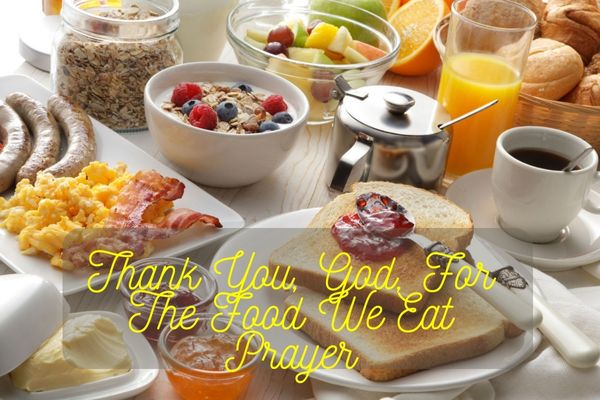Table of Contents Show
Thank You God For The Food We Eat Prayer
“Thank You, God, for the food we eat, for the hands that have prepared it, and for the nourishment it provides. Bless the hands that planted, harvested, and transported these sustenance to our table. May this food fuel our bodies, nurture our spirits, and strengthen our bonds as a family. Amen.”
In the simplicity of the above prayer, we find a profound expression of gratitude that transcends the act of eating. This prayer, “Thank You God for the food we eat prayer” is a timeless acknowledgment of the interconnectedness of our lives and the divine providence that sustains us.
Let’s explore more insights on the subject matter below.
Cultural Variations in Mealtime Prayers
Impact on Mental and Emotional Well-being
Expressing gratitude through the “Thank You God For The Food We Eat prayer” extends far beyond a mere ritual before meals; it significantly influences mental and emotional well-being. Let’s look into the profound ways in which this simple act of gratitude shapes the human psyche and contributes to a more positive and resilient mindset.
- Cultivating a Positive Mindset: The prayer sets the tone for a positive mindset by redirecting focus from daily stressors to the abundance present in the moment. By acknowledging the sustenance before them, individuals are prompted to view their circumstances through a lens of gratitude.
- Stress Reduction and Relaxation: Regular practice of prayer has been linked to stress reduction. Taking a moment for gratitude before meals provides a pause in the day, creating a space for relaxation and a break from the demands of a busy life.
- Fostering Emotional Resilience: Gratitude is a powerful tool in building emotional resilience. The acknowledgment of blessings, even in the form of a simple meal, contributes to a greater ability to bounce back from challenges and navigate life’s ups and downs with greater ease.
- Shifting Focus from Lack to Abundance: In a world often characterized by a focus on scarcity, prayer encourages a shift in perspective. Individuals are prompted to move from a mindset of lack to one of abundance, appreciating the food before them and the resources that have made it possible.
- Creating a Habit of Positivity: The regular practice of expressing thanks before meals can create a habit of positivity. Over time, this habitual gratitude becomes a natural part of an individual’s thought patterns, influencing their overall outlook on life.
- Enhancing Connection to the Present Moment: Gratitude has a grounding effect, pulling individuals into the present moment. The prayer becomes a mindful practice, fostering an awareness of the here and now, rather than dwelling on past regrets or future anxieties.
- Promoting a Sense of Well-being: Studies have shown that individuals who incorporate gratitude practices into their daily lives report a higher sense of well-being. The “Thank You, God, For The Food We Eat” prayer contributes to this sense of overall wellness by fostering appreciation for life’s simple pleasures.
- Improving Relationships and Social Connections: A positive and grateful mindset cultivated through prayer spills over into interpersonal relationships. Grateful individuals are often more compassionate and empathetic, strengthening their social connections and contributing to a more harmonious social environment.
- Reducing Symptoms of Anxiety and Depression: Gratitude has been linked to a reduction in symptoms of anxiety and depression. The act of acknowledging blessings, including the food on the table, can serve as a protective factor against mental health challenges.
- Encouraging a Lifestyle of Gratitude: Beyond its immediate impact, prayer encourages individuals to adopt a broader lifestyle of gratitude. This can extend to various aspects of life, promoting an overall sense of contentment and fulfillment.
Family and Community Bonding
Within the family unit, the “Thank You God For The Food We Eat prayer” becomes a unifying force. It establishes a sense of togetherness as family members join in expressing thanks. Beyond the family, communal expressions of gratitude strengthen social bonds, fostering a sense of community and shared appreciation.
In the family setting, the prayer serves as more than a prelude to a meal; it becomes a unifying force. As family members gather around the table and collectively utter words of thanks, a palpable connection forms. This shared acknowledgment of divine providence creates an atmosphere of warmth, love, and appreciation. It instills a sense of belonging as each member contributes to the collective expression of gratitude, reinforcing the idea that the act of eating is not just a physical necessity but a shared experience that binds them together.
Beyond the family unit, the prayer resonates in communal settings, transforming the act of eating into a collective celebration. Whether in religious congregations, community events, or shared meals among friends, the prayer becomes a unifying thread. Its repetition in a group setting not only strengthens the sense of community but also emphasizes the shared values and beliefs that underpin the act of expressing thanks.
Making the Prayer a Personal Practice
Incorporating prayer into daily life is a transformative practice. Simple tips, such as setting aside a moment for reflection before meals, can turn gratitude into a habit. The cumulative effect of habitual gratitude extends beyond the dining table, influencing how individuals perceive and interact with the world.
However, making the “Thank You God For The Food We Eat prayer” a personal practice is not only achievable but profoundly transformative. Here’s a closer look at practical steps to infuse this prayer into your daily routine and turn gratitude into a habitual and enriching part of your life:
1. Create a Sacred Moment
- Designate a specific time for expressing gratitude before meals. It could be during breakfast, lunch, or dinner, whichever suits your daily rhythm.
- Choose a quiet and peaceful space, free from distractions, to create a sacred moment for reflection.
2. Pause and Reflect
- Before diving into your meal, take a moment to pause. This simple act of slowing down allows you to shift your focus from the external world to the present moment.
- Reflect on the journey of the food to your table, appreciating the hands and processes involved.
3. Use Personalized Phrasing
- While the traditional wording of the prayer is beautiful, feel free to personalize it. Use language that resonates with you and reflects your unique connection with spirituality or gratitude.
- Making the prayer your own adds a personal touch, enhancing its meaningfulness.
4. Incorporate Mindfulness Techniques
- Combine the prayer with mindfulness techniques. Focus on your breath, engage your senses, and be fully present as you utter the words.
- Mindfulness amplifies the impact of the prayer, creating a deeper sense of connection.
5. Keep a Gratitude Journal
- Extend the practice beyond mealtime by keeping a gratitude journal. After expressing thanks for your food, jot down a few additional things you’re grateful for.
- This journal becomes a tangible record of your daily blessings, reinforcing the habit of gratitude.
6. Share the Moment with Others
- If you’re dining with family or friends, invite them to join in the practice. Sharing the moment of gratitude enhances the communal aspect of the prayer.
- It creates a shared experience, fostering a sense of togetherness and strengthening relationships.
7. Adapt the Prayer for Different Occasions
- While the prayer is traditionally associated with meals, feel free to adapt it for various occasions. Express thanks during celebrations, special events, or moments of reflection.
- Adapting the prayer makes it a versatile tool for infusing gratitude into diverse aspects of your life.
8. Consistency is Key
- Like any habit, consistency is crucial. Commit to making the prayer a daily practice, even on hectic days.
- Over time, the act of expressing thanks becomes second nature, enriching your daily experiences.
9. Reflect on the Transformative Power
- Periodically reflect on how incorporating gratitude into your daily life has impacted your overall well-being.
- Recognizing the transformative power of the prayer reinforces its significance in your journey.
10. Celebrate Milestones
- Celebrate your milestones in embracing this practice. Whether it’s a week, a month, or more, acknowledge your commitment to cultivating gratitude.
- Rewarding yourself for consistency reinforces the positive association with the practice.
Beyond Religious Boundaries
The beauty of the “Thank You God For The Food We Eat prayer” lies in its ability to transcend the confines of specific religious affiliations, making it a universal expression of gratitude. While rooted in spiritual traditions, this prayer possesses a timeless quality that resonates with individuals irrespective of their religious backgrounds or even those with no specific religious affiliation.
Individuals who may not identify with a specific religious doctrine find solace and connection in the simple act of expressing thanks. It becomes a moment of mindfulness, a pause in the day, where individuals can connect with a broader sense of purpose and acknowledge the interconnectedness of all living beings.
Moreover, the “Thank You God For The Food We Eat prayer” opens a door for individuals to craft their spiritual narratives. It invites personal interpretations and reflections, allowing individuals to infuse the prayer with their unique beliefs, values, and perspectives. In doing so, it becomes a deeply personal and meaningful practice, independent of rigid religious structures.
In a world where differences often divide, the universal language of gratitude binds. It emphasizes that, regardless of our paths, backgrounds, or beliefs, the act of expressing thanks is a unifying force that transcends the boundaries we construct. The shared experience of gratitude becomes a bridge, connecting hearts and fostering a sense of shared humanity.








